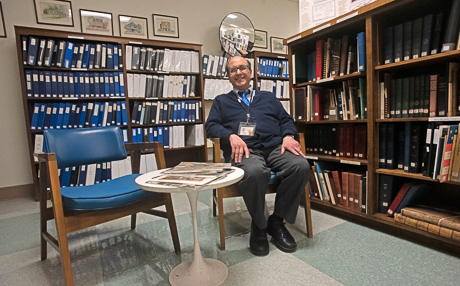
Just take those old records off the shelf / I’ll sit and digitize them by myself / There’s just not as much room today / To store our records the same ol’ way.
Put the tune of Bob Seger’s “Old Time Rock and Roll” to the lyrics, and county Historian Dr. Michael Eula could really sell the idea to a toe-tapping beat.
As it was, Eula had no such accompaniment during his recent presentation to the county’s Human Services Committee. But then again, he had no problem with his request to save the county money. Eula wants to apply for a grant to get his department’s record-digitizing project off the ground — and into the clouds, so to speak.
The project would take old paper records and transform them into digital format at the History Department and Records Center in County Building 2.
“We need to get those records off the shelf,” he said. “Not only to get them digitized but to increase shelf space. If we can get more than $75,000, that would be great, $75,000 is not a whole lot of money, but it’s a movement in the right direction to get these records digitized.”
Not those kinds of records, the long players and 45s of Seger's era, but paper records of history — census reports of births, deaths, who owned slaves, church minutes from the early 1800s, genealogy collections, marriages, divorces, military records, maps and school documents. Just imagine your ancestors’ heritage not being duly protected for posterity — that’s a topic worth paying attention to.
The goal of the department has been to ensure that records are properly administered and available to local government officials, citizens, and researchers. And Eula’s efforts will also save some taxpayer money, he said.
Many records have to be kept for at least 50 years, and some are to be kept permanently, he said. He has found a way to do it while saving the county money, retaining the necessary resources to help, and applying for the grant himself without a costly consultant fee.
“I’m asking for permission to apply for a $75,000 grant with the local government records management improvement fund … basically, it boils down to this: I want to see digitized our long-standing records in terms of what the retention schedule requires, 50 years to permanent, I'd like to be able to get those off the shelf, get those digitized, in particular, to not only save shelf space but also to allow people to access files that they need from their desk,” Eula said. “That would go a long way to cutting down a lot of the foot traffic that comes in and out of the Records Center. So I'm hoping this grant application will be successful. And before we proceed with it, I want to obviously get permission from this county to write the application. Once those records are digitized, they can be destroyed while the digital versions are stored in a master file in the Cloud.”
There are “giant volumes” of payroll records that date back to the 1980s, and people ask for them all the time, he said, related to pension purposes. Imagine if he or his part-time clerk didn’t have to thumb through stacks of paper to retrieve that data and could instead do a search on computer.
“It would make that whole process easier,” he said.
The county uses services from Biel’s of Rochester for electronic document management, with a big chunk of the grant money earmarked toward that service. Not only is it about space savings, and more efficiency, he said, but there are other departments located on the other side of town — Social Services, for example — and staff would have to drive over to West Main Street Road, search for documents, and drive back to the office. Once everything is online, it would just require some keywords and a click to retrieve that same material without leaving one’s desk. That's time and money saved, plus a big convenience right there.
What would it cost to completely digitize everything?
“We’re looking at somewhere between $200,000 and $250,000,” he said.
Although he did not get this grant the first time he applied, or perhaps because of that, he feels more confident this time around, he said. He has a better sense of what the granting entities are looking for and plans to check in with other municipalities that have received the grant to obtain tips for what to include in this next application. A company quoted him upwards of $10,000 to write the grant, but Eula would rather save taxpayers that money and do it himself, risking no extra expense.
“It’s a very competitive grant, very bureaucratic,” he said. “You have to know key phrases. They’re not very forthcoming in telling you why you were turned down.”
The deadline for applying is March 2024, so he’s getting a jump start on the process, but he also knows how quickly time goes by, so he’s aiming to be done by the end of the year.
“I am confident this time around,” Eula said. “There’s no guarantee. I do think now, having some time now, this one stands a good chance of being successful.”
Dr. Michael Eula, Genesee County historian, at the History Department in County Building 2 in Batavia. Photo by Howard Owens.
